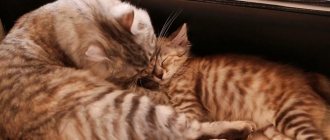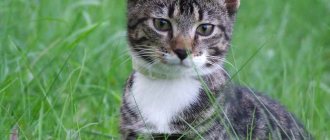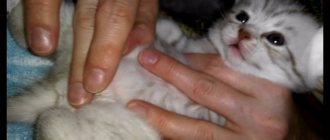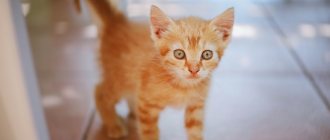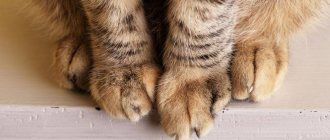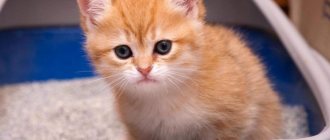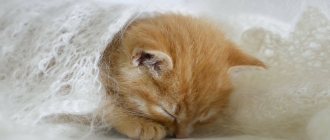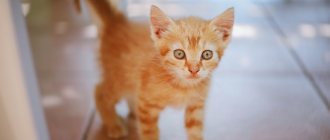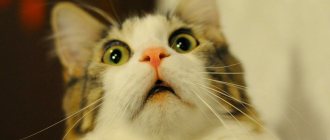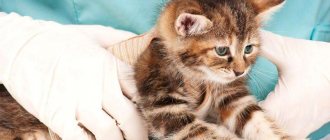Small kittens, like small children, have their own bowel habits during the early stages of life. If you decide to get yourself a one-month-old kitten, or your ward cat has brought you a litter of cute little lumps, then you should know how to properly care for them. While everything is more or less clear regarding the nutrition of kittens in the first months of their life, questions may arise with the process of evacuation. One of the most common ones is: “How often should a kitten poop?” The health of your pet depends on the answer to this question, so you need to be especially competent in it.
Do newborn kittens defecate?
Some people will find this question strange. Can kittens not poop? But where then do the products of their vital activity go?
In fact, kittens have been peeing and pooping since birth, but owners may not even notice it because the mother cat comes to the rescue. She simply licks the feces from her babies. During the bathing process, the cat involuntarily massages their tummies, which improves blood circulation and digestion.
The stool of animals during the first month of their life is homogeneous, similar to condensed milk. Therefore, it can be quite difficult for owners to determine how often kittens poop during this period. But this does not mean that they do not defecate at all.
How many times a day does a kitten pee?
When you bring home your new kitten, you probably have a lot of questions. And one of them might be: “How often do kittens pee?”
Because kittens typically use their own litter box, kitten owners are at a distinct disadvantage compared to puppy owners. If you have a dog, you'll usually have a good idea of how often he pees because you'll often be on walks with him!
Kittens tend to urinate in private and are oblivious to their toilet habits. So how do you know how many times your kitten pees?
What to do if a kitten grows up without a mother cat?
It doesn’t always turn out that a small pet grows up next to its mother. In this case, you should become the baby's mother.
It is you who will have to feed the animal and help it with bowel movements. It should be remembered that food for a kitten up to a month should only be liquid or semi-liquid. This has a significant impact on the process of emptying it. If you do not know what to feed a one-month-old kitten, it is better to contact a veterinary pharmacy. There they will help you choose the optimal “baby” food for your ward.
If you don't know how often little kittens poop, pay attention to the appearance of their bellies. When it is swollen, it means that the baby has problems with bowel movements. Perhaps he simply cannot yet, due to his age, do without outside help.
A bloated stomach will cause him pain. You are required to gently massage his abdomen, avoiding strong pressure. Then you need to take a piece of gauze and soak it in warm water. Use the device to slowly massage the outlet of the rectum. These manipulations should help the kitten begin to relieve itself. Perhaps in the future he will no longer need your help.
When do kittens pee in the litter box?
Kittens largely learn to use a litter box when they begin to urinate and defecate on their own, around 3-4 weeks of age. This process is actually quite unusual as it is based on both instinct and observation.
Kittens have a natural instinct to scaveng on the ground or sand. This instinct is very primitive and goes back to the wild ancestors of our kitten, who peed only in those places where they could subsequently actively hide their smell.
Our pet kittens still retain this instinct, and by providing them with a litter box, we give them the perfect place to pee!
Kittens also watch their mothers closely and learn to use the litter box simply by watching. Most cat owners will never need to formally "train" their kitten to use a litter box because by the time they arrive at their new home, they will likely have been doing it for several weeks.
One of the few times kittens won't want to use the litter box is if they are disabled or have arthritis.
Accustoming to adult food and litter box
How often kittens poop at 1 month is easier to determine, since now this process becomes more pronounced. This happens because at approximately this age, that is, at 3-4 weeks, pets begin to be switched to more solid food. Consequently, the process of defecation also becomes more complex and organized.
At the same time, it is necessary to accustom the baby to the tray. This is how you need to act right from the first emptying, otherwise it will be more difficult to do this in the future.
Monitor your pet's behavior carefully. Usually, before the process of defecation, the behavior of animals acquires certain features. Their so-called “search activity” is activated. They can rush around the room, look for a suitable place to relieve themselves, sniff the space around them and, finally, scratch their paws on the floor.
This is how most kittens behave. However, there are also “quiet people” who silently do their business somewhere in the far corner under the bed. So be careful.
In what cases should you consult a veterinarian?
Sometimes in kittens the development of bowel and bladder emptying is accompanied by disturbances. Deviations from the norm can be a symptom of serious problems with the internal organs of a small four-legged pet. You can recognize them in time by:
- constant monitoring of the baby’s behavior during defecation and urination;
- assessing the consistency, color and odor of urine and excrement;
- analysis of the frequency of bladder and bowel movements.
Frequency of bowel movements
Despite a more organized defecation process, determining how often a one-month-old kitten should poop is still difficult, but not impossible. On average, this happens three to six times a day.
The difficulty of determining is that the stool in animals at this age is mushy. It can easily be confused with urination, especially if you are training your pet to use a litter tray.
In general, how often kittens poop at this age is not important. The main thing is that the structure of the feces does not contain undigested food residues, mucus, blood and other impurities that may indicate a malfunction of the digestive system.
If your kitten is active, playful, cheerful, and his belly is soft and not bloated, then you have nothing to worry about. So you are doing everything right!
Why do problems with stool occur?
When planning to have a furry pet, future owners must understand the responsibility they take on for the life and health of their beloved cat. It is very important to provide proper care, create optimal living conditions, and think through the diet. The period of adaptation and socialization should be favorable, without stress. Any negative factors can weaken the immunity of animals and provoke changes in behavior and the functioning of internal organs and systems.
If an older kitten has a normal appetite, eats well, but there is no bowel movement, the fluffy does not go to the toilet, this condition can be provoked by various factors.
Causes of constipation in small kittens:
- Stress. A change of place of residence, a trip to the veterinary clinic, the presence of other animals in the house, and other stressful situations can lead to the absence of defecation. The kitten may not poop or go to the toilet for two or three days.
- Early weaning from the cat. Missing his mother in his new home, the fluffy may experience problems with bowel movements for up to four to five days. This is normal, but if the situation does not change, seek help from a veterinarian.
- Unbalanced nutrition, sudden changes in diet, consumption of foods rich in protein. In the first weeks and months, try to give your pet the same food that he received from his previous owners. Introduce new products gradually. You should not change your diet suddenly. If the baby is kept on a natural diet, do not suddenly switch the animal to ready-made food.
- Helminthic infestations. Constipation in young kittens can be caused by worms. Intestinal parasites disrupt digestive processes, worsen general condition, and can cause intestinal blockage.
You need to accustom your kitten to new foods and solid food gradually, in small portions. In order not to disrupt the digestive processes, solid food should be crushed and mixed with milk and boiled water to a creamy consistency.
Important! For kittens aged three to five weeks, the food used for complementary feeding should be at room temperature, liquid, semi-liquid consistency.
If your baby cannot poop for more than five to seven days or experiences discomfort during bowel movements, consult your veterinarian. The cause of this condition can be health problems, systemic disorders in the functioning of internal organs and systems. If your kitten often suffers from constipation, consult your veterinarian and adjust your pet’s diet.
© shutterstock
Difficulty defecating in kittens
The transition to adult food and the need to defecate independently, and even in a designated place for this, can lead to a number of difficulties. By how often a one-month-old kitten poops, you can determine whether he has difficulty defecating.
A prolonged absence of stool (more than two days) or problematic bowel movements indicates that the kitten is constipated. The reasons are poor nutrition or a small amount of water consumed by the animal. However, things can be much more serious. Constipation may indicate a disease, and not only of the gastrointestinal tract.
You can help your little pet by adding a little vegetable oil to his food. The presence of vegetables, cereals and fermented milk products in the diet will also have a laxative effect.
If these methods do not help, then use medicinal laxatives such as Duphalac, Festal, Espumisan or Vaseline oil.
In the case when these methods do not help, you have to use the most radical one: give your pet an enema. At home, you can only administer a specially designed microenema. Only a veterinarian gives a deep cleansing enema, since you yourself can harm the kitten.
How often should a kitten poop: normal bowel movements by age
Each period has its own defecation norms. Before 3 weeks of age, a healthy animal usually poops 3-6 times a day. The tummy should be soft and toned. The stool has a mushy consistency.
Each period has its own defecation norms.
If it contains mucus, blood, undigested food, or is too dry or greasy, then this is a reason for the animal to be examined by a veterinarian. When calculating, you should understand that babies can sometimes relieve themselves in the most secluded place.
As a cat grows, its nutrition changes, the thickness and density of feces increases, and feces become almost the same as those of adult animals. The number of visits to the tray is largely determined by what is included in the diet.
If it contains more plant fiber, then the kitten will poop less than when fed food with a predominance of proteins. Typically, a grown animal defecates 2-3 times a day.
Diarrhea in kittens
Another, no less unpleasant defecation disorder in kittens is diarrhea.
Before diagnosing your pet, you need to figure out how often kittens poop and whether it’s diarrhea at all. Many owners believe that if a kitten’s stool becomes liquid, then this is diarrhea. However, it is not.
Diarrhea is not only watery stool consistency, but also a frequent urge to defecate. An additional symptom may also be bloating.
The causes of diarrhea in an animal can be helminthic infestations, poor nutrition, infectious and inflammatory diseases. On a psychological level, early separation of a kitten from its mother can provoke diarrhea.
If a kitten has diarrhea, it is advisable not to feed it for about 12 hours, but to give it only water. By the way, he must drink. Not drinking water can lead to dehydration.
In this case, a sorbent such as Smecta or Enterosgel can be used as a medication.
If attacks of diarrhea no longer recur, then after 12 hours the pet can be fed. First, a little boiled rice or three-day (!) kefir is given. Fresh fermented milk products can only worsen the situation. The next day, boiled chicken meat, and so on, expanding the diet.
In any case, self-medication is not recommended for either people or animals. Therefore, if there are various disturbances in the process of relieving yourself in your little family member, you need to show him to the veterinarian.
Adults
A cat can be considered relatively mature from the age of 6 months. By this point, internal processes in their bodies usually normalize, and pets also develop their own habits. However, trips to the toilet can still be quite frequent - up to 3 and 5 times, respectively.
The cycle is finally established after a year. It is then that you can clearly trace the number and frequency of visits to the tray, and also notice that they often coincide in time.
Adult cats with a moderate diet go to the toilet “largely” 1-2 times a day.
As for the functioning of the urinary system, everything is somewhat more complicated: it is structured differently in males and females. So, the urinary ducts of cats are much thinner and more tortuous, so they are unable to completely empty their bladder, which, in turn, leads to more frequent sitting in the litter box - up to 4 times a day. Neutered cats go to the toilet even more often, and even 6 trips in 24 hours is considered the norm in their case.
Cats usually go to the litter box 1-2 times a day, but during pregnancy these numbers may be slightly higher.
In rare cases, castrated cats and sterilized cats, characterized by low mobility and laziness, can go to the toilet even once a day without experiencing any problems.
As for quantitative indicators, in a healthy adult animal, on average, the amount of excrement per day can reach 100 grams, and urine - up to 500 milliliters.
Host mistakes
You can find out how often a kitten poops at 2 months by how many times it visits the litter box. But the animal does not always choose a pot to satisfy its natural needs. This may be the owner's fault. Here is a list of possible reasons:
- Late trained to use the tray. The most optimal age for this is one month. Later it will be more difficult.
- Dirty pot. If you don't clean the litter box in time and change the filler, the kitten may go somewhere else. Remember that cats are clean animals!
- Wrong place. If the litter box is in a place that scares and the kitten doesn't like, he won't go in it.
- Another tray. If you decide to change your pet's litter tray, be prepared for the fact that he may refuse to relieve himself in the new one. In this regard, cats are monogamous.
- Foreign odors. The cat may not like the smell from the potty, and therefore he will refuse to go into it. Therefore, you need to exclude all flavors and wash the tray with plain water. It is also forbidden for several animals to go into one tray.
- Don't punish. This method will not help you accustom your pet to the tray, but will only instill fear of the owner.
- Doesn't shit where he eats. If your pet has chosen another place as a toilet, make his dining room there, after washing everything with odor eliminating products.
- Health problems. If you follow all the rules, but the kitten still shits in the wrong place, you should contact a veterinarian.
How to understand that a kitten wants to go to the toilet
The mother maintains the hygiene of the offspring for about the first four weeks, then the young animal begins to solve toilet issues on its own.
In order for the kitten to remember well where its latrine is and not make mistakes, the owner needs to learn to recognize the signals of a pet that wants to go to the toilet.
In order for the kitten to remember well where its latrine is and not make mistakes, the owner needs to learn to recognize the pet’s signals
It's easy to notice:
- if the baby runs around the room, intensively sniffs objects and the floor, uses his claws, then he is looking for a place where to do big or small things;
- if the kitten scratches the floor and tries to dig a hole for the toilet, then you urgently need to transfer the animal to the tray;
- the eyes of an animal that is in a big mood are frozen and as if glassy.
Be sure to read:
Wood litter for cat litter: types, the best companies, how to use, pros and cons
Kittens at a tender age already understand where their toilet is and, due to the cat’s innate cleanliness, they want to go there. If there are misfires, then it is an accident or illness.
Preventing constipation and diarrhea
You've already learned how often kittens poop and how to care for them. A loving owner should also take care of preventing problems with bowel movements. To do this you need:
- comb the animal regularly so that excess hair does not clog the intestines when licking;
- give kittens phytomines to cleanse the intestines;
- feed your pet a variety of foods, using foods rich in fiber;
- give space for your pet’s active life, which improves intestinal motility;
- contact your veterinarian in time.
Filler:
Our kittens are accustomed to wood filler. This is the safest litter for kittens.
If you want to transfer the animal to another litter, then it is advisable to do this after acclimation in your home and gradually. (Until this time, kittens are very stupid and if a kitten eats clay or absorbent filler, it will at least have an obstruction, and it is unlikely that anyone will operate on a small kitten)
If you decide to change the filler, this is done like this: leave the base with the filler you have chosen and sprinkle the top layer with wood, gradually removing it completely from the tray.
Of the clumping litters, I like Pi-Pi-Bent 10 kg paper bags best and Ever clean is also clumping, they should be poured in a deep layer into the tray.
Scratching post and nail trimming: The kitten must have a scratching post. All babies are accustomed to sharpening their claws.
If the nails are long and bothering you or the animal, you can trim them. You can buy a nail clipper at a pet store.
If you want to purchase a complex, then it must be stable, with a large number of shelves.
In our nursery, all complexes are ordered on the website Kotograd.ru
There is a large selection and you are sure to find one to suit your taste.
Ears: Ears are best cleaned with wet wipes specially designed for this purpose. They can be bought at any pet store. But you can use regular wet wipes.
Washing: Washing the animal is recommended as needed. Do not overuse washing.
For washing, use only professional shampoos: Jerob, Pet Silk, Bio groom
Vaccinations: Vaccinations are given once a year (Quadriquet, Multifel + rabies) The next vaccination is given one year after the date of the last vaccination, which is indicated in the veterinary passport. Further throughout life, the vaccine is given once a year.
Before vaccination, 10-14 days before vaccination, the kitten must be dewormed by weight with Canikquantel or Milbemax)
If an animal eats meat and offal, it is advisable to deworm it every 3 months by weight.
If possible, flea treatment should be done with Frontline or Advantage.
The cat shits in the wrong place
Usatii often combines criminal activities with legal ones, i.e. defecates both in and around the litter tray. Sometimes urine/feces in unauthorized places act as territory markers: this is what insecure animals do.
Reasons why a Maine Coon ignores its toilet:
- the cat doesn’t like the tray (shape, size, material);
- the cat is not satisfied with the placement of the tray;
- The cat is not happy with the litter.
You will return your pet to the right path by eliminating the root cause of the crime . The following will help eliminate odors on the floor/walls:
- disinfectant solutions;
- vinegar diluted in water;
- solution of potassium permanganate (weak);
- soda ash.
But if a cat urinates on the carpet, the latter will most likely have to be thrown away.
There are also preventive measures, which, however, do not work for everyone: lemon peels (in “dangerous” areas), special sprays, foil (whose rustling cats cannot stand) and tape (to which tailed animals really do not like to stick).
Physiological reasons
These include genitourinary diseases, colds, worms, constipation and other ailments. Only a doctor can make an accurate diagnosis. Therefore, before punishing your Maine Coon, take him to the veterinary clinic.
Psychological disorders
This category is represented by such cat emotions as:
- resentment;
- attention deficit;
- jealousy;
- revenge;
- sadness;
- high/low self-esteem.
Maine Coons can be alarmed by renovations, moving, and even rearranging/buying furniture . Not finding the old marks, he will begin to mark the territory again. A cat can defecate in an apartment even after other animals appear in it in order to assert its rights.
Return to content
Subtleties of education
To minimize the risk of your Maine Coon wandering off anywhere, limit his movements during the first month, leaving access to the litter box, kitchen, hallway, bathroom and one room.
Allowed Methods
At the first sign of anxiety (the cat is spinning and meowing), move it to the tray and place it on the bottom. Lightly rake the litter as cats do.
As soon as the Maine Coon goes into the tray, praise and pet him, reinforcing the skill. If your pet does not have time to reach the tray, blot the puddle with a napkin and put it in the tray: its smell will orient the cat next time.
This is interesting! They say that the Maine Coon is affected by hissing at the moment when he makes a puddle in front of your eyes. But you need to hiss immediately, and not after a few minutes/hours.
Prohibited tricks
Making your cat nervous will only delay the process of litter box training . In the arsenal of erroneous methods:
- screaming, irritation, swearing;
- physical punishment;
- repositioning the tray;
- fillers with sultry aromas.
Special advice to those who like to “poke the cat with its muzzle”: this trick will not work with a Maine Coon (it is not known who will poke whom).
Return to content
